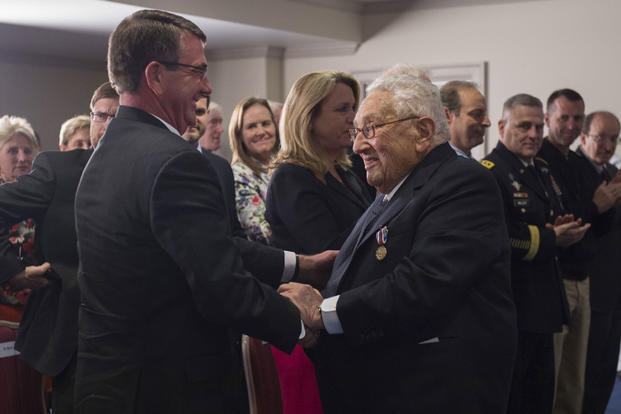Former Secretary of State Henry Kissinger dipped into presidential politics Monday while defending his legacy as a statesman and strategic thinker.
At the Pentagon, where he received the Distinguished Public Service Award, the 92-year-old warned against the tendency of the presidential contenders -- he didn't name them -- to put all blame for the state of the world on current and past administrations.
Kissinger said, "We are entering a presidential campaign and it seems to be the habit of particular figures now to contrast themselves with the evils of their predecessors" going back to Presidents Richard Nixon and Gerald Ford, whom he served as national security adviser and secretary of state, respectively.
Those nameless "particular figures" are also trying to "contrast themselves with the evils of the incumbent," he said, while sidestepping what those evils might be. As for his own case, he said, "the fact is we were engaged in good causes" through his turbulent tenure in shaping foreign policy.
In a sense, the issues confronting the U.S. in the 1960s and 1970s -- ending the war in Vietnam, détente with the Soviet Union, opening to China and the ever-present turmoil in the Mideast -- were easier to grasp and to formulate policy proposals that would have the support of the nation, Kissinger said.
"In the period of the Cold War, the United States had such dominant material capacity that the allocation of resources to a specific task became the overriding task," he said. Simply identifying a problem would "enable us to overwhelm it with resources," he said.
But the world has changed and the old solutions no longer apply, Kissinger said.
"As the decades went by, we found ourselves in situations where we couldn't achieve what we wanted simply by identifying the problem," he said.
Through it all, the Department of Defense has been a bedrock of stability and moral clarity, Kissinger said.
Referring to the Vietnam protests at the Pentagon, he said, "There were times when there were demonstrations and it was difficult to come here but one never had a doubt that this was a place where people were concerned with overcoming the challenges to our security and to the security of the world."
In awarding Kissinger the highest award the department can bestow on a civilian, Defense Secretary Ashton Carter said that Kissinger's career was "unique in the annals of American diplomacy.
Kissinger -- hailed as a seminal thinker by his admirers and a "war criminal" by his critics -- had "demonstrated how serious thinking and perspective can deliver solutions to seemingly intractable problems," Carter said.
--Richard Sisk can be reached at Richard.Sisk@Military.com.






























